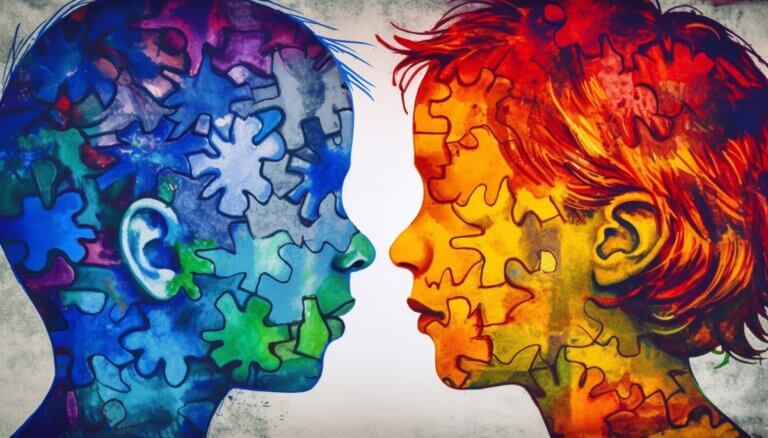Table of Contents
The Role of Emotional Intelligence in the Development of Resilience

Self-Perception and Emotional Awareness
Emotional intelligence and resilience are key components that shape personal strength in times of volatility. These two skills enable individuals to adapt to challenges and even emerge stronger from them. The focus here is self-awareness, a deeper understanding of one’s own emotional world.
Self-Awareness as a Foundation
Imagine a manager under pressure: While a person without pronounced emotional awareness might react impulsively and possibly destructively, someone who accurately captures and understands their emotions will find solutions in a methodical way. This awareness is a crucial factor for emotional resilience and adaptability.
- A teacher, who consciously perceives disappointment over the failure of a project, can use this emotion as a stimulus for improvement and as a learning opportunity.
- An athlete, who clearly identifies her nervousness before a competition, can apply specific techniques to calm down and thus optimize her performance.
- A team leader, who feels anger over a conflict in the team, consciously opts for constructive conflict resolution strategies rather than escalating into a futile argument.
The Role of Emotional Intelligence in Crisis Management
Even in times of crisis, emotional intelligence and resilience provide a robust foundation. People with pronounced emotional intelligence are capable of regulating their emotions and thus promoting their own resilience development. This emotional toolkit empowers them to not only cope with crises but also to emerge stronger from them.
- An entrepreneur affected by a sudden market crisis uses his emotional understanding to remain rational and make quick, yet considered decisions.
- A nurse in a pandemic, who recognizes her fears and worries, can employ targeted coping strategies to remain capable and care for her patients.
- A student, faced with stress during exam periods, draws on his self-awareness to establish effective study habits and prevent burnout.
The ability for self-awareness is more than a luxury; it is a necessity for those who want to be successful in a fluctuating world. It is a skill that can be learned and honed – and it allows us to weather turbulent times not just to survive, but to emerge more powerful. By recognizing and managing our emotions, we form an unshakable foundation for personal development and success.
Emotion Regulation and Coping Strategies
Emotion regulation and coping strategies are essential components of Emotional Intelligence and Resilience, enabling us to remain steadfast even in difficult times. They are considered key components for personal growth and success, both in professional and private life.
Emotion Regulation in Professional Life
Imagine a heated meeting where a project team becomes conflicted due to differing opinions. A leader with high emotional intelligence recognizes the emerging tensions and gets the discussion back on track with a calm and collected approach. By consciously controlling their own emotions and empathetically addressing team members, they not only promote a positive work environment but also convey appreciation and respect.
- The key lies in self-awareness; recognizing one’s own emotional states and trigger points is crucial.
- Self-regulation is equally important, that is, responding appropriately to emotions instead of acting impulsively.
- Techniques such as deep breathing, mediation, and reflection can help control one’s emotional response.
Strategies for Interpersonal Conflicts
Emotion regulation also plays a significant role in the personal environment. A classic example is a dispute in a partnership. Emotionally intelligent individuals are capable of understanding and managing both their own emotions and those of their counterpart. They use constructive communication to clear up misunderstandings and seek a solution that meets the needs of both parties.
- Empathy, the ability to feel into the emotions of others, facilitates bridging differences in opinion.
- Listening is just as important as speaking – often, understanding the other person’s perspective helps resolve the conflict.
- Emotional resilience allows one to not take setbacks or criticism personally and instead proceed in a solution-oriented manner.
The application of these coping strategies can significantly contribute to improved Emotional Intelligence in crisis management. We strengthen our resilience development by learning to perceive emotions not as an enemy, but as a guide, teaching us to handle challenges. Emotional Intelligence and Resilience are like muscles we can train – and the more we do, the more adaptable and resistant we become to the storm of emotions.
The Significance of Emotional Intelligence for Adaptability

The Importance of Emotional Intelligence for Adaptability
Emotional intelligence and resilience are critical factors when it comes to building meaningful and fulfilling interpersonal relationships. Particularly, the competence of empathy, which is the ability to put oneself into the emotional world of others, plays a key role here.
Empathy as a Bridge Between Individuals
Genuine understanding between people does not arise merely through the exchange of words. It is the deep emotional connection made possible by empathy that bridges the gap between individuals. For example, empathetic leaders lead teams to success by taking their needs and concerns seriously and offering individual support. This creates a work environment where employees feel not only understood but also valued – a key to building emotional resilience.
- A therapist who empathizes with the suffering of their patients not only provides comfort but also paves the way for deeper insights into their emotional patterns.
- In a partnership, empathy allows partners to view conflicts not as a battle, but as an opportunity to better understand each other and grow together.
- In dealing with friends, an empathetic ear often provides the best support in challenging times.
Adaptability through Understanding
Change is a constant in life. Integrating emotional intelligence into crisis management means sharpening one’s adaptability. Empathy allows us to recognize situational dynamics and act accordingly. Consider the situation of a sudden crisis in a team: An empathetic leader will first consider the emotional reactions of the team members. This not only sets the basis for effective communication but also fosters an atmosphere in which challenges are overcome collectively with resilience and strong cohesion.
Emotional Intelligence as a Catalyst for Relationships
Emotional intelligence and resilience also act as a catalyst for deepening relationships. By showing empathy, we invite others to open up and trust us. This mutual understanding is the foundation upon which long-lasting and sustainable relationships can be built – whether in a private setting, professional context, or in friendship.
In conclusion, empathy and emotional intelligence not only contribute to the development of resilience but also represent a crucial element for understanding the social world. By honing and utilizing our empathetic abilities, we navigate with more ease and success through the complexity of human relationships – and at the same time provide a safe harbor for others.
Social Competencies and Team Dynamics
Emotional Intelligence and Resilience: Cornerstones of Social Skills in Teams
In today’s fast-paced work environment, social competencies are not just desirable but essential prerequisites for success. The interplay between emotional intelligence and resilience, emotional sturdiness, plays a central role. Research on team dynamics shows that individuals with high emotional intelligence can navigate not only themselves but also their team members through times of crisis.
Interpersonal Sensitivity and Team Effectiveness
Team members with pronounced emotional abilities can more easily build connections, resolve conflicts, and establish a strong, supportive network within their groups. Emotional intelligence enables them to recognize subtle nonverbal signals and respond adequately. This creates an environment where openness and mutual understanding can unfold.
A practical example is the project leader who, through mindfulness, perceives mood swings within the team and proactively initiates supportive measures to boost morale and prevent burnout. Such leaders can specifically influence the Emotional Resilience of their team members, thereby increasing the team’s overall resilience.
Adaptability through Emotionally Intelligent Communication
The importance of adaptability in teams cannot be overstated. Members who can communicate effectively and adapt to changing circumstances are an asset to any organization. Emotionally intelligent communication includes active listening, empathy, and expressing one’s needs appropriately. Effective communication leads to fewer misunderstandings and fosters a culture of trust and cooperation.
For example, teams in crisis situations that experience clear, calming communication thanks to the emotionally intelligent leader. This enhances the Emotional Intelligence in Crisis Management and helps the team to collectively overcome the crisis with united forces.
Emotional Intelligence as a Precursor for Resilience Development
Ultimately, emotional intelligence significantly contributes to resilience development. Individuals who can understand and regulate their own emotions can better handle stress and are more resistant to challenges. They are the pillars that support and stabilize the team during difficult times.
A specific example is the experienced employee who maintains composure in a restructured department and encourages colleagues to view the changes as an opportunity. Through his resilient behavior, he inspires the team to adopt a positive attitude and together develop new solutions and work methods.
In summary, emotional intelligence is the foundation for building and maintaining strong, resilient teams. As each member trains and applies their emotional skills, a dynamic, adaptable, and high-performing team structure emerges.
Summary
Emotional intelligence and resilience are crucial factors for personal growth and adaptability in an ever-changing world. These skills allow us to face challenges constructively and use them as opportunities for development. Particularly important here is self-awareness, the thorough understanding of one’s own emotional responses, which forms the basis for emotional resilience.
Individuals equipped with emotional intelligence and resilience are able to manage stress situations and act more effectively in crisis resolution. They utilize their emotional understanding to make quick, yet thoughtful decisions, thereby remaining capable of taking action. This also fosters the development of resilience by enabling them not just to survive, but to emerge stronger from a crisis.
- Emotional intelligence enables leaders to effectively resolve team conflicts through calm and empathetic approaches.
- Someone with high emotional intelligence manages to handle personal stress moments through targeted coping strategies, e.g., deep breathing or meditation.
- Emotion regulation techniques support the processing of setbacks and contribute to improved communication and problem-solving.
Practical Application of Emotional Intelligence and Resilience
Emotional intelligence is a key factor in developing strong interpersonal relationships. The ability to empathize, to put ourselves in the emotions of others, allows us to communicate more effectively and build deeper connections. In professional contexts, empathetic leaders lead their teams to success by addressing individual team members and creating a work atmosphere marked by recognition.
- Emotional intelligence and resilience improve team effectiveness by providing a supportive network and reducing misunderstandings.
- Adaptable team members who communicate with emotional intelligence are an asset to any organization.
- Emotionally intelligent communication includes active listening, empathy, and an adequate expression of one’s own needs, which are essential for the development of resilience.
Sharpening our emotional intelligence is essential not only for professional success but also for our private lives. It enables us to provide a safe haven for others while navigating through the complexities of human relationships. Emotional intelligence and resilience are thus cornerstones of social skills that help us guide ourselves and others through turbulent times.
FAQ – Emotional Intelligence and Resilience
How does emotional intelligence contribute to fostering resilience during difficult life events?
Emotional intelligence encompasses the ability to recognize, understand, and regulate one’s own emotions and those of others, which is crucial in order not to be overwhelmed by feelings during challenging life events. It empowers us to employ constructive coping strategies, manage stress, and learn from challenges, significantly strengthening our resilience, i.e., psychological fortitude. A practical example of this is when someone acknowledges their disappointment and fear after losing a job, but accepts these emotions as temporary and consciously seeks solutions and new opportunities.
How can emotional intelligence help strengthen resilience in stressful situations?
Emotional intelligence allows us to recognize our own emotions and manage them appropriately, leading to a conscious regulation of fear and tension in stressful situations. This enables us to develop solution-oriented strategies and make clear decisions under pressure, which significantly strengthens our inner resilience. With skills such as empathy and social competence, which are also part of emotional intelligence, we can additionally build and maintain effective social support, contributing significantly to stress management.
How can emotional intelligence enhance a person’s ability to adapt to new challenges while remaining mentally resilient?
Emotional intelligence enables a person to recognize and understand their own emotions and those of others, which is particularly helpful in new challenges to respond appropriately and regulate stress-related reactions. This strengthens resilience, as a conscious handling of emotions makes it easier to cope with setbacks and quickly adapt to changes. Practically, this means that in an unexpected work situation, for example, someone with high emotional intelligence can quickly channel fear and surprise into constructive avenues and act solution-oriented.




